Dragon Lord (1982)
Directed by: Jackie Chan
Written by: Barry Wong, Edward Tang, Jackie Chan
Starring: Jackie Chan, Kang-Yeh Cheng, Mars, Whang Ing-Sik
AKA LUNG SIU YEH
HONG KONG
AVAILABLE ON BLU-RAY AND DVD
RUNNING TIME: 103 mins [‘work-in-progress’ version]/96 mins [Hong Kong version]/94 min [international version]/89 mins [US DVD version]
REVIEWED BY: Dr Lenera
Dragon, the son of a Chinese aristocrat, is always getting in trouble, and likes to skip his lessons. He knows some martial arts skills, but doesn’t impress his teacher father. When he and his best friend Cowboy both fall for the same girl Ah Dee, rivalry ensures. Then the two get mixed up with a villainous plot to sell stolen Chinese artifacts, first when Tiger, one of the bad guys, turns good and is chased to where Dragon and Cowboy are hanging out, then when Dragon tries to send a love note to Ah Dee via a kite, only for the kite to land on the roof of the gang’s headquarters….
Dragon Lord is, to me, one of those Jackie Chan films that I always seem to remember to be considerably better than it actually is. New Fist Of Fury and Police Story 3: Supercop are two others I can think of. It definitely has its highlights, its moments where you gasp at the stunning choreography, amazing invention and physical prowess that’s before you, action where you can tell the participants have truly pushed themselves – to the point of considerable danger – to present to the viewer action that is real, with minimal cutting and lots of wide shots reminding us that this is not Hollywood – not even Hollywood in 1982, but definitely not the Hollywood of today where frantic cutting and CGI is almost making stunt work obselete. But the film is a mess, full of scenes which seem to have been randomly placed into what I guess made some sort of sense at the time. Of course we don’t watch Chan films for tight plotting; he’s always admitted that he and his writers think up set pieces first and then a story is written to bridge them. And Hong Kong films often begin shooting with just a treatment ready, the script being constructed as they went along. But here it seems that Chan became so obsessed with perfection in his action scenes that he it hurt the film as a whole. It’s also curiously low on fighting, with several points where it seems like we’re going to get something and then it doesn’t happen which is the Hong Kong movie equivalent of prick teasing. Chan was obviously trying to move away from typical martial arts in what was his last traditional genre movie until 1994’s Drunken Master 2, but hadn’t yet hit on the winning mixture of brawling with comedy, other types of action and stunt work which he properly unleashed into the world in Project A.
So Chan returned from the States having made Battlecreek Brawl and The Cannonball Run, and launched into The Young Master which will be reviewed soon by me seeing as its also coming out on Blu-ray from 88 Films. Virtually Chan’s defining statement on the traditional martial arts movie, it was huge, so he began work on a sequel, Young Master In Love. However, while Chan’s character is still addressed as ‘Young Master’ several times on screen, the various rewrites took the story away from its intended predecessor. Location filming was supposed to largely take place in Thailand, but after just one day Chan decided it was too cold so production relocated to Taiwan. Dragon Lord went over budget and took twice as long to shoot as was originally planned due to Chan’s many retakes of scenes to get them exactly as he wanted them. One shot in the film is reputed to have taken 2900 takes to get right, although sources disagree as to whether the scene in question is the opening one involving a human pyramid or a sequence depicting a jianzi [shuttlecock football] game. As usual, Chan injured himself, this time his chin when doing a jump, which made it hard for him to say his lines and direct for several weeks. This is the first Chan film that includes outtakes [bloopers]. He was inspired to do this by the use of them at the end of The Cannonball Run. This time box office was disappointing. Five minutes of dialogue were cut from the International Version, while the Blu-ray includes an early alternate cut that’s six minutes longer and has the opening bun festival scene placed at the end.
So we begin with a ‘king of the mountain’ type event, and it was right to re-place this sequence here as there’s no action afterwards for nearly half an hour. Teams of young men climb to the top of a huge structure to claim a golden egg, and you can well believe the claim by Ti Po, one of the stunt people involved, that no stunt person escaped unscathed. After lot of grabbing, pushing, falling and the odd martial arts move, Dragon gets the egg, but now has to fight his way to a table in a combination of kung fu and rugby. Despite winning, Dragon is next seen hanging with his buddy Cowboy, something that he clearly prefers doing to his martial arts training which doesn’t impress his father, played by Tien Seng who also taught him in The Young Master, though he wasn’t also his father in that. Yet again Chan plays the student who doesn’t take things seriously, and by now we can see that this certainly isn’t Young Master 2 even if it was originally intended to be, because Chan’s character is basically where he was at the start of the previous film. For a while it’s mainly Dragon and Cowboy goofing around, chasing girls, even peeing together, the latter act of course ending in a ‘joke’. Well, I laughed. The funniest scene, the one that bore the brunt of the edits for the International Version, is when Dragon has to recite poetry for his father and his mates try to help him by doing actions behind father’s back and even sticking a piece of paper on father’s back. Dragon and Cowboy both use underhand tricks to try to get to Ah Dee, but she’s not having any nonsense which lessens the irritation of the familiar Hong Kong movie borderline sexual harassment. “May I see you again” he asks. “Only when I ask” she replies.
It’s nice to see perennial Chan stunt guy Mars aka Cheung Wing-Fat get a decent part, and he and Chan share some chemistry together, but the film doesn’t seem to know where it’s going even before we get to the jianzi game which is highly impressive; however, if one Chan action scene is too long, it’s this one unless you really dig sports. The subplot of Chinese treasure being stolen was later repeated in both Drunken Master 2 [which was similar in many ways] and Rush Hour so it’s obviously one close to the very nationalist [and that’s the closest I’m going to get to talking about his politics] Chan’s heart. This element of the story and the adventures of Dragon and Cowboy are reasonably well brought together, and it’s funny that the main bad guy, just called ‘The Big Boss’, avoids doing much to Dragon on their first two meetings and even stops his men from attacking him. He’s played by hapkido master Whang In-Shik who also played the chief heavy in The Young Master, and one side of his face is always obscured before finally he’s given a full facial entrance horror movie-style with several rapid jump cuts each getting closer to a white eye! Dragon is most interested in getting to Ah Dee, and his visit to the rooftop where his kite has mistakenly landed offers us the sight of Chan effortless scaling a wall and a rope, then having loads of spears being shoved through the roof he’s walking on, many of them very narrowly missing him. But for the rest of the film Ah Dee is totally forgotten about in perhaps the most glaring of the screenplay’s faults, and everything just seems like a lengthy way to get Chan and In-Sik having their rematch.
It’s quite different to their previous encounter, being much shorter, taking place indoors with stairs and beams being scaled, and more reliant on street-fighting as Chan flails, crawls and eventually resorts to basically cheating. Both Chan and In-Shik do huge falls, Chan landing right on top of Mars! But the way the script totally leaves the stolen artifacts issue is typical of its haphazard nature. I almost admire the way it tries to subvert the traditional martial arts movie by not delivering what it appears to promise, such as the way Chan does some terrific moves early on in training and fails to use any of them later, but for this to succeed the film needed a better constructed and more involving storyline. The first time we think we’re going to see a brawl is when two guys start irritating Ah Kee and even leering into the camera. But instead Chan and Mars briefly wrestle each other, a scene which itself far more could have been made out of. Eventually we get a fight when Dragon is confronted with two henchmen. Chan climbs and leaps over things, but mostly avoids, hardly ever striking back, and eventually relies on his mates to save him. Chan was trying out a new style of action. In Project A he would combine this non-offensive form of fighting with a bit of actual fighting, along with even greater use of the environment, thereby creating the Jackie Chan style that he’d go on to perfect. But in Dragon Lord it just frustrates, and then we come to what seems like the final battle, only for most of the bad guys to decide to turn good and Dragon only having the Big Boss to battle. Again, better plotting would not have necessarily made this a problem. But when a film of this genre isn’t really working, one tends to rely on plentiful fighting to save the day.
Chan is just Chan, playing virtually the same character he’d played in Snake In The Eagle’s Shadow, Drunken Master, The Fearless Hyena and The Young Master. He and Mars are really too old for their parts, but Chan’s exuberance and charm still work, and he gives himself far fewer opportunities to ham it up in this one. The Jackie Chan persona that the man would develop in the likes of Project A and Police Story is really a close variant. It’s undoubtedly unusual to see a Chan character so interested in a woman – generally he’s not too bothered about them even he’s in a relationship – which might be why it’s ignored in the second half as Chan wasn’t interested in his character becoming too involved. Instead we’re left with the theme of friendship, with Dragon and Cowboy ending the film still causing trouble. Outside of the Jackie Chan/Sammo Hung/Yuen Baio collaborations and the Rush Hour and Shanghai Noon films, I can’t think of a Chan film that more explicitly emphasises this theme. This gives Dragon Lord something of a heart, and I reckon that Chan was often thinking of this but got somewhat lost in what he was otherwise trying to do. It’s basically a transitional film, and it rarely being talked about in Chan’s oeuvre is understandable. But it still sure has its highlights.
Rating: 









So what’s this ‘work in progress’ version like then? In addition to placing the bun festival game at the end, it contains lots of extra little bits, but also loses a small amount of stuff. The sport sequences have a few more beats, including more great stunt work; the added footage in the pyramid bit works but I did feel that the jianzi game was a bit too long in the first place so it certainly didn’t need any extra material. But there’s also Tiger arguing with the other thieves and alternate material of him leaving the gang, more of the poetry scene including Dragon throwing a huge book to his two buddies while quoting poems, and most notably Dragon’s father announcing the good news that he doesn’t want to marry him the girl chosen for him. However, it’s Ah Dee, the girl Dragon has the hots for, so he asks him not to call off the wedding. The latter scene should definitely have remained in, instead of the love story being totally discarded. However, three scenes are missing; Dragon and co. paying the girls a visit and they are being welcomed with tomatoes, water and eggs, a tiny fight involving Tiger, and a cannonball gag at the end which would have made no sense with the bun festival now being the climax. Said scene may have been shot after this version was put together.
There are pros and cons of both, but the alternate version has the edge for me.

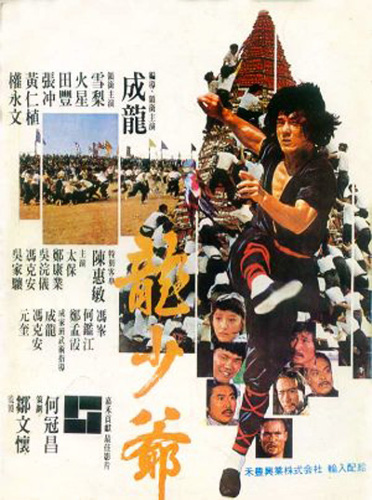
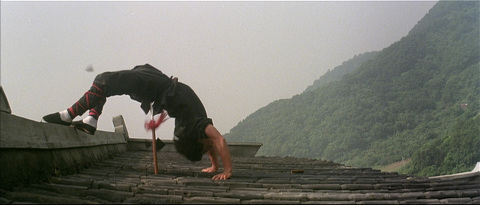


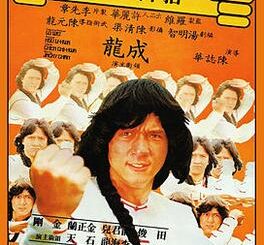
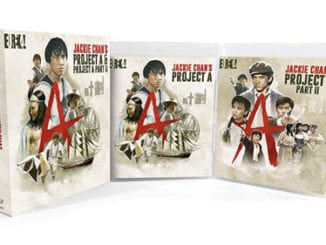
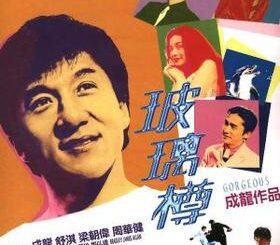
Be the first to comment